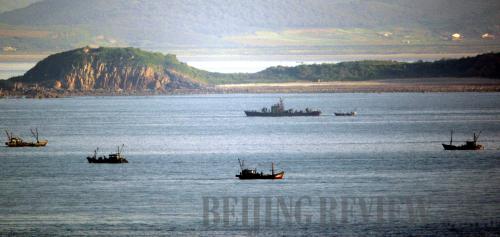|
 |
|
CHRONIC CONFLICT: A North Korean Navy patrol boat is seen on May 31, 2009, among North Korean fishing boats from the South Korean-controlled Yeonpyeong Island near the two countries' disputed waters, the scene of previous inter-Korean clashes in 1999 and 2000. In the latest clash on January 27, 2010, North Korea fired artillery near the disputed sea border with South Korea, and Seoul's military returned fire, according to a report of South Korean Yonhap News Service (XINHUA/AFP) |
Last month, in the aftermath of bilateral talks between the United States and North Korea over its nuclear weapons capacity, Pyongyang offered a unique proposal. It was a precedent, but nonetheless not necessarily a harbinger of better things to come.
On January 11, the North Korean Government called for a peace treaty by December 2010 to formally end the Korean War that had first broken out 60 years earlier.
Since the Korean War unofficially ended in 1953 with the demarcation of the Demilitarized Zone (DMZ) along the 38th Parallel, there has been no formal truce between North Korea and South Korea. The DMZ, which stretches across the peninsula, is now the most heavily fortified border area in the entire world.
Still, the biggest and most dangerous wild card remains North Korea's nuclear program—and not least because of a massive underground test earlier last year.
At the same time, the success of international efforts to assert control over North Korea's nuclear weapons, however, have proven limited at best.
The first serious attempt to do so occurred under the auspices of the so-called Agreed Framework treaty signed by the United States in 1994 during the Clinton administration. On September 19, 2005, a Joint Statement of the six-party talks was issued in the stark absence of political trust.
In addition to the United States, North Korea and South Korea, the other members of the six-party talks consist of China, Japan and Russia.
Mutual confidence, Pyongyang diplomats are now arguing, should be contingent on a peace treaty that will replace the 1953 armistice. In this context, the North Koreans say negotiations on the peace treaty should be carried out either within the framework of the six-party talks, or in a separate forum, according to the Joint Statement of September 19, 2005.
While rekindling hope for the resumption of the stalled six-party talks, Pyongyang's new proposal underscored the complex nature of the Korean nuclear issue.
An impractical proposal
Not surprisingly, the international community has not blanched at North Korea's latest proposal. Indeed, it poses a fundamental philosophical dilemma that offers no clear-eyed, obvious answer: That is, which should come first, a peace treaty or North Korea's denuclearization?
While Washington wants to see a nuclear-free Korean Peninsula, Pyongyang feels it badly needs security guarantees. It is not only eager to normalize relations with the United States, but also seeks to put a formal end to decades of hostilities.
Clearly the two sides cannot realize these immense goals simultaneously. For instance, participants in the six-party talks have yet to reach a consensus on when—much less how—negotiations on a peace treaty should be carried out.
Moreover, they have discussed the normalization of U.S.-North Korea relations as only a side issue. Consequently, agreements of the six-party talks tend to become extremely sensitive and vulnerable when implemented.
By contrast, North Korea's most recent suggestion has squarely focused on its own concerns. But making the conclusion of a peace agreement a precondition to denuclearization is fraught with flaws. Rather, now that agreements forged at the six-party talks have not been implemented on good faith, conducting negotiations on a brandnew treaty are pointless.
Moreover, a peace treaty that can resolve the security issue on the Korean Peninsula should not only be a treaty of non-aggression, but should also address the heavy presence of military forces along the DMZ.
In the end, it would be anything but practical to negotiate a peace treaty before the nuclear issue is fully resolved.
Despite its unrealistic demands, North Korea's latest proposal has at least shown a change in its attitude—and it is a hopeful one. This has brought the normally hard-line stance of North Korea to one that embraces the art of diplomacy—at least on its face.
The shift has presented both considerable opportunities and momentous challenges for the international community.
Multilateral efforts
Despite rejecting Pyongyang's proposal, Washington has implied that a peace treaty could be discussed so long as North Korea agrees to resume the six-party talks.
White House spokesman Robert Gibbs, for one, has indicated that North Korea needs to return to the six-party talks and take actions toward denuclearization before further progress can be made in peace talks.
"If they're willing to live up to those obligations," he told reporters shortly after North Korea called for a peace treaty, "then we will make progress in those talks."
| 